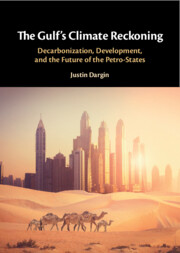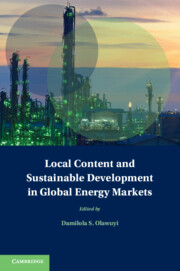Refine search
Actions for selected content:
8 results
1 - The Philosophy of Oil: Theorizing Development in the Gulf States
- from Part I - The Birth of the Petro-State: How Oil Reshaped the Gulf
-
- Book:
- The Gulf's Climate Reckoning
- Published online:
- 13 October 2025
- Print publication:
- 30 October 2025, pp 15-47
-
- Chapter
- Export citation
Introduction - Climate Crossroads – Gulf Decarbonization and the Legacy of Oil
-
- Book:
- The Gulf's Climate Reckoning
- Published online:
- 13 October 2025
- Print publication:
- 30 October 2025, pp 1-12
-
- Chapter
-
- You have access
- HTML
- Export citation
5 - Gaslighting the Gulf: The Perils of Low-Priced Natural Gas
- from Part I - The Birth of the Petro-State: How Oil Reshaped the Gulf
-
- Book:
- The Gulf's Climate Reckoning
- Published online:
- 13 October 2025
- Print publication:
- 30 October 2025, pp 128-142
-
- Chapter
- Export citation

The Gulf's Climate Reckoning
- Decarbonization, Development, and the Future of the Petro-States
-
- Published online:
- 13 October 2025
- Print publication:
- 30 October 2025
5 - The Shadow of Colonialism, 1865–1945
-
- Book:
- A Concise History of Jamaica
- Published online:
- 23 November 2023
- Print publication:
- 14 December 2023, pp 228-302
-
- Chapter
- Export citation

Local Content and Sustainable Development in Global Energy Markets
-
- Published online:
- 05 March 2021
- Print publication:
- 04 March 2021
Part I - The Setting
-
- Book:
- Creating Private Sector Economies in Native America
- Published online:
- 15 October 2019
- Print publication:
- 24 October 2019, pp 9-64
-
- Chapter
- Export citation
2 - Opportunities to Diversify: Reservation Workplaces and Job Numbers Compared to Nearby County Areas
- from Part I - The Setting
-
-
- Book:
- Creating Private Sector Economies in Native America
- Published online:
- 15 October 2019
- Print publication:
- 24 October 2019, pp 37-64
-
- Chapter
- Export citation
